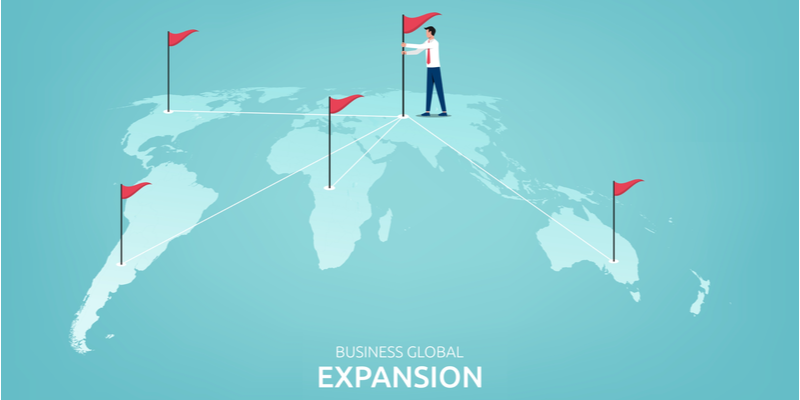
By
Leanna Seah
June 3, 2022
Updated
September 18, 2024
Should your business consider global expansion?
Yes. Global expansion has the potential to raise your business to new heights. It opens up your business up to international markets, global talent, and most importantly, opportunities for growth.
Expanding a company and its services globally is a strategic business move. It aligns with a goal many organizations' have, that is to expand their global footprint.
While the idea of taking your business global is wildly enticing, bear in mind that it is not without its fair share of challenges. More often than not, these challenges can be unpredictable.
Enter a global expansion strategy.
What is a global expansion strategy?
 Source: dikiprayogo/Shutterstock
Source: dikiprayogo/Shutterstock
A global expansion strategy may show itself in various forms. It is essentially an in-depth business plan that depicts how said organization expands its operations internationally. This strategy will include:
- Methods to penetrate foreign markets
- Identification of target countries
- Customer base
- Understanding of talent pool
- Product strategy
- Country specific employment policies
- Risk mitigation policies
- Business costs in foreign location
- Collaborating with global partners to enhance expansion
For an expansion strategy to work successfully, dispatching a team dedicated to the strategy should be a priority. Realistic goals, budgets, and timelines should be identified and agreed upon across the board.
These are crucial as they will form the bedrock of a successful international expansion strategy. Addressing the concerns above creates a robust international expansion strategy that enhances revenue growth.
How does a business benefit from a well executed expansion plan? We get into that below.
Areas that your business benefits from having a global expansion strategy
 Source: Christianchan/Shutterstock
Source: Christianchan/Shutterstock
Increase & diversify market presence
Access is an asset. Businesses stand to have monumental gains by having access to not only new customers but also a wider talent pool. An international expansion often takes place once the home country customer base has been maximized.
Catering to a new customer base diversifies a company's growth. You will be able to assert your presence in the new location with existing products and develop a larger international status. Companies can also use the new target market to innovate new products and services to create more revenue streams.
With a strong expansion plan in place, your business is able to focus its remaining resources into studying the market. Efficiently analyzing market data allows you to start tapping into the local customer base with a larger yield.
Gain competitive advantage
Enter the market before your competition. This is a familiar rule in business and rings true in international expansions as well. Going abroad with your business helps you expand beyond a saturated market. It benefits your business to tap into a new source before your competitors to establish your brand first.
To gain a competitive advantage, a business must be able to build a robust presence in the new market. With a global expansion strategy in place, the organization establishes a clear direction to achieve realistic company goals. The strategy will account for available resources in the global expansion process to ensure its success.
With the strategy in place, decisions involving hiring, budgeting, marketing, branding, operations and market research will be made with a clear direction. The business will be able to operate and compete more effectively in the new location having set boundaries in all these areas.
This allows your business to gain more credibility, which in itself is attractive to customers and talent.
Increases profit margin efficiently
 Source: Natalie_mis/Shutterstock
Source: Natalie_mis/Shutterstock
A business seeks growth through revenue. Introducing new services or products in a dense market requires a great amount of resources with little yield. International expansion brings about new sources of revenue for the organization to capitalize on. Diversifying your portfolio and adapting a new business model to your new market creates access to new revenue streams.
A company's profit margin is likely to see a rise in this area with the help of an international expansion strategy. It creates a smoother and more cost-effective approach to operations as opposed to a rash jump into the target market.
Since each international market is unique, your global expansion strategy should be aligned with the climate of your host country. Only then will the business be able to maximize profits and utilize its new revenue streams effectively.
Scale your business faster with reduced loss to operations
The focus point in any expansion strategy is speed to market. A hasty expansion endeavor can incur losses but with a strategy in place, your business will be able to minimize that risk.
At this stage, engaging with global mobility partners will prove effective in your expansion strategy. They possess experience and resources to deploy in your expansion, allowing your business to channel its resources to maintain operations.
Find out how partnering with a global partner like Airswift can increase your speed to market.
The cost of taking international expansion lightly
Let's review some familiar businesses that have attempted to take their business operations international.
 Source: Nilsversamann/Shutterstock
Source: Nilsversamann/Shutterstock
Starbucks has a presence in over 80 countries. You would assume that it has a robust business expansion strategy. But did you know that they incurred a $143 million loss in Australia?
The famed café took to the land down under in 2000 looking to increase their international growth. Unfortunately for them, their expansion strategy did not account for the café culture and coffee market at the time. Starbucks proved to be too expensive and could not sustain operations. In 2008, they closed 61 stores with a reported loss of $143 million.
Starbucks's mistake here was to underestimate the market for Australian coffee. They also overestimated the target market's need to visit coffee chains. This shows us that they failed in including a vital step during the initial stages of their expansion plans: Having a global strategy that took into account the local preferences of the Australian market.
 Source: atikan_pornchaiprasit/Shutterstock
Source: atikan_pornchaiprasit/Shutterstock
Now let's review McDonalds' approach to global expansion. yet another global company that has penetrated the overseas market countless times successfully. What sort of business expansion strategy did they implement? How were they able to adopt the right expansion process for each foreign country?
McDonalds' use a glocal approach. They carry identical branding to every country they expand to but also add new region-specific items to the menu. By doing so, they are able to capture the local target market in a personal way. This marketing technique has proved successful for them and has been injected into their international business expansion strategy.
Like the above, there are many more examples of failed and successful international expansions. The key to being the latter is placing importance on robust strategies that prioritize a local approach before executing the expansion.
Navigate the effects of globalization with your international expansion strategy

Source: Lookerstudio/Shutterstock
Globalization ties in closely with the contents of this article. Riding the globalization wave demands many businesses to uproot their existing business models. To adopt globalization is to create an international influence and to take operations to the global stage.
The 2022 GETI Report for example, shows that one third of the current petrochemical workforce are composed of expats. The energy sector as a whole is embracing globalization with nearly nine out of ten oil and gas companies considering relocation. Energy companies are adopting and perfecting policies that cater for remote work. This gives them access to international talent and international employees with region specific skill sets.
Understanding globalization and using its effects on the global market will set an organization aside among its competitors. It creates a brand image that promotes modernization and the willingness to embrace globalization. This not only attracts customers but also talent.
Manage your international expansion with Airswift as your global partner
Partnering with global entities like Airswift helps you face your challenges with an arsenal of resources on hand. Combating the challenges of global expansion creates barriers for business growth. A global partner however, can help you navigate these barriers and shape your business’ foreign presence.
At Airswift we carry with us 40 years of experience and resources that are at your disposal. For example, using our Employer of Record (EOR) services will manage all employee matters within legal compliance. This will allow your organization to focus its resources on region-specific product development to generate new revenue streams.
As an Employer of Record service provider, the suite of solutions we provide extend far beyond just hiring talent. EOR comprises a wide range of functions from international payroll services and tax administration to comprehensive HR services, overseeing employment contracts, and employee immigration. Get in touch with us at Airswift and to learn more about how our custom solutions can support your business at every stage of international expansion.
